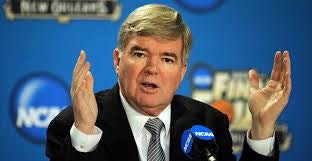 NCAA President Mark Emmert contends his organization has not violated antitrust laws.
NCAA President Mark Emmert contends his organization has not violated antitrust laws.
In the NCAA president’s first public comments since Friday’s ruling, Emmert told ABC’s “This Week With George Stephanopoulos” that college sports’ largest governing body found a lot in the decision that was “admirable” and some parts they disagreed with so strongly that they could not let it go unchallenged in court.
“Yes, at least in part we will,” Emmert said when asked whether the NCAA planned an appeal. “No one on our legal team or the college conferences’ legal teams think this is a violation of antitrust laws and we need to get that settled in the courts.”
The NCAA’s decision to challenge the ruling is hardly a surprise.
Donald Remy, the organization’s chief legal officer, had repeatedly said that, if the NCAA lost, it would appeal the case all the way to the U.S. Supreme Court if needed. Many legal experts think this case could be heading that direction, though it’s unclear whether the nation’s highest court would take it.
“We remain confident that the NCAA has not violated the antitrust laws and intend to appeal,” Remy said in a statement released following the television show. “We will also be seeking clarity from the district court on some details of its ruling.”
Joseph Farelli, an attorney with the New York-based law firm of Pitta & Giblin who specializes in labor law, said the NCAA didn’t have a choice after U.S. District Judge Claudia Wilken on Friday shot down the NCAA’s argument that its model of amateurism was the only way to run college sports. Wilken wrote that football players in FBS schools and Division I men’s basketball players must be allowed to receive at least $5,000 a year for rights to their names, images and likenesses, money that would be put in a trust fund and given to them when they leave school.




















